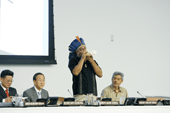Permanent Forum on Indigenous Issues: the voice of Mother Earth
Published on Mon, 2011-05-23 13:08
Sources: IPS, The Financial The first global UN inter-agency initiative to promote and protect the rights of indigenous peoples was launched on May 23 on the occasion of the 10th Session of the United Nations Permanent Forum on Indigenous Issues. The United Nations-Indigenous Peoples’ Partnership (UNIPP) initiative is a commitment to the UN Declaration on the Rights of Indigenous Peoples and calls for its full realization through the mobilization of financial cooperation and technical assistance. UN Secretary-General Ban Ki-moon, while welcoming the initiative , urged all countries “to support this new initiative so that it can fulfill its potential to turn the Declaration’s principles into reality.” He noted that “indigenous people suffered centuries of oppression, and continue to lose their lands, their languages and their resources at an alarming rate. “Despite these obstacles” he added, “indigenous people make an enormous contribution to our world, including through their spiritual relationship with the earth. By helping indigenous peoples regain their rights, we will also protect our shared environment for the benefit of all.” The aim of the UNIPP is to secure the rights of indigenous peoples, strengthen their institutions and ability to fully participate in governance and policy processes at the local and national levels, including conflict prevention in regard to ancestral land and use of natural resources. Many indigenous communities are witness to exploitation of these lands and resources by extractive industries – in many cases without regard to their rights. For his part, Marcos Terena, a prominent leader of the Brazil's indigenous people, showed skepticisms. ”Nations must pay more than lip service to the idea of indigenous rights if they hope to seriously address problems like species loss and climate change”, he said. "They present very good studies and information, but not for us," added Terena. "They talk to Sao Paulo, New York, and the World Bank, not us (…) their ideas are all about how much they want from the rivers and how much they want from the air." In Terena’s view, the transition to a so-called "green economy" will not work as long as humanity doesn't respect the rights of Mother Earth. "The meanings of green economy are different to us than that which comes from the white man," he said. "I hope the U.N. will understand and listen to the indigenous people, and not only produce papers," he said about the U.N. Environmental Programme-led session at the forum meeting. "The paper is no good. It is bureaucracy. It is no good for the indigenous men, women and children. I hope the U.N. in the future would understand the voice of Mother Earth." His views were shared by numeorus delegates to the forum, which concludes May 27. Thus, Victoria Tauli-Corpuz, who led the U.N. Forum on Indigenous Issues for five years, underscored that most governments still lacked the political will to enforce indigenous people's rights. "They are still resisting the indigenous movements," she told IPS. "But they should understand it is in their own self-interest to support native peoples' rights. It is time for the former colonial powers to learn from the indigenous people because they live in closeness with nature and abide by the laws of nature." Indigenous peoples' traditional knowledge has been widely acknowledged as vital to conservation and efforts to fight climate change. However, the states that have signed on to the treaties on climate change and biodiversity are not taking measures to promote indigenous knowledge. One-third of the world's 370 million indigenous people are condemned to live in poverty in as many as 70 countries around the world. World Bank estimates put their share of global poverty at 60 percent. The Declaration on the Rights of Indigenous Peoples was adopted by the U.N. General Assembly 2007. Since then, native communities around the world have been complaining about abuses of their rights by state authorities as well as private firms. In many cases, indigenous activists also faced abusive treatment at the hands of law-enforcement agencies while resisting illegal occupation of their lands by companies doing business in mining, logging and oil exploration. The 10th session of the Forum will conclude by the end of next week. |
SUSCRIBE TO OUR NEWSLETTER



